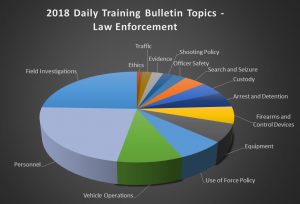The concept of reasonableness as it pertains to police use of force topped the list of training topics covered in Lexipol’s Daily Training Bulletin (DTB) program in 2018. The language “reasonably believes” or “reasonably necessary” as it pertains to use of force stems from the Supreme Court decision Graham v. Connor, which has been the standard for judging police use of force for nearly 30 years. The Court recognized officers must make split-second, life-or-death decisions with limited information, and therefore an officer’s actions should be judged from the perspective of a reasonable officer on the scene and not with the benefit of hindsight.
Agencies using Lexipol’s Daily Training Bulletin (DTB) program had access to 360 unique law enforcement training bulletins on this and other topics last year, providing a total of 12 hours of training. Many states provide POST credit for completion of the DTBs.
The 2018 summary report from Lexipol organizes training topics into 14 main categories and more than 150 subtopics. The top three main categories were Field Investigations, Personnel and Vehicle Operations. The top subtopics were:
- Reasonableness
- TASER device
- Pursuit policy
- Report preparation
- Non-criminal incidents/public contacts
- Vehicle maintenance/inspections
- Misuse/damage of agency property
- Injury/illness prevention/PPE
- Handcuffing
- Email/department computers/Mobile Data Terminal
DTBs use a proven system of solid, realistic, ongoing and verifiable training to expose officers to an agency’s policies and help them apply policy to real-world situations. The bulletins are authored by Lexipol’s Training Team and use scenarios to bring policy to life and enhance officer understanding of their policies.
“Our Training Team members are current and former law enforcement officers, instructors and administrators, so they have a wealth of practical knowledge relating to critical topics such as officer safety, use of force and de-escalation,” says Don Weaver, Training Director for Lexipol. “We design our training bulletins to focus on a specific aspect of the agency’s policy and present them in the form of scenarios because we know this helps enhance learning retention—the officers are being asked to consider how their policy works in the real world.”
Many DTBs are inspired by current events. Weaver says that in 2018, as in years past, scenarios based on media accounts and court decisions were used to train officers to interpret and apply policy.
To access the complete listing of 2018 topics, click here.




